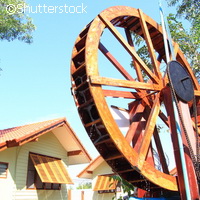Countries use innovation to deal with climate change
While we hear of the effect climate change is having around the world, it is refreshing to hear of innovative ways that EU countries are helping to reduce the damage. In a pan-European contest organised by the European Commission, more than 70 organisations from across Europe have taken part in a campaign called 'A world you like. With a climate you like', which aims to find the best and most original idea for combating climate change. The campaign showcases existing cost-efficient solutions for achieving the EU's objective of an 80-95 % reduction in greenhouse gas emissions by 2050. One town which has become energy efficient while also revitalising the local economy and increasing tourism, is Varese in northern Italy. Faced with a bleak future 10 years ago, the decision was made to boost agriculture by using sustainable energy. As a result, the town now produces surplus electricity and sells the energy it doesn't use back to the national grid for EUR 350 000. But this is just one of many examples of clever, innovative climate solutions across the EU, which is reducing carbon dioxide (CO2) pollution and also improving people's quality of life. Another example is Stockholm's central rail station, which converts the body heat of commuters into heat for a nearby office building, reducing not only emissions but also the building's energy bill by up to 25 %. In Denmark, the Gedved school in Horsens saves EUR 30 000 a year on energy through solar power, with the money saved being spent on improving education. Landfills are also being used to produce green energy. At Getlini, one of Latvia's biggest landfills, an overhaul of operations means that non-recyclable waste is deposited in safely sealed biodegradable cells that cannot be penetrated by either air or water. The gas generated within these cells passes through the Getlini power unit, where it is transformed into electricity and heat. This creates new energy sources from what has been thrown away. Meanwhile, a German company, WeberHaus, builds energy-independent homes, with ecological insulation and photovoltaic lighting systems. They predict that, on average, their homes produce 55 % more energy than needed to fulfill domestic energy needs. The surplus energy is then transferred to a supply point in front of the house, from which homeowners can charge an electric vehicle. In Dublin, Ireland a Green Plan has been put in place to improve sustainability at the local fire station, with energy consumption being reduced by 80 %. The station now saves, on average, nearly 45 000 litres of water per month, recycling almost 40 % of all waste. The Baltic Sea is also being used to power a museum in Tallinn, Estonia. The building sources its energy from a method based on sea-heating, which not only keeps the visitors warm, but also the energy bills down. In Debrecen, Hungary they are revolutionising the way we approach food. When traditional aquaculture turns water into sewage, this poses threats to marine life. But their Akvapónia food production system filters the water through a hydroponic system in which plants absorb vital nutrients, eliminates the toxic substance and recirculates clean water back to the animals. In the end, it grows CO2-neutral, pesticide-free produce. Hotels are also looking at ways to reduce emissions. In particular, the Bohinj Park Hotel in Slovenia has become one of the most energy-efficient hotels in central Europe, simply by using solutions such as LED lamps, geothermal energy, heat transfer systems and electric car charging stations. As a result, they produce 56 % fewer emissions than a traditional hotel, preventing 63 tonnes of CO2 from entering the atmosphere every year, and with a carbon footprint 90 % less than that of a traditional hotel. Finally, with Christmas upon us, lights are being made more energy efficient with the Lavola company in the town of Manlleu, Spain having developed festive light installations from existing infrastructure. Gold-plated aluminium decorative chains of varying lengths hang from the street lamps. Easy to install, they reflect the sunlight during the day and the street light at night and thus require no energy. The campaign will run until the end of 2013 and seeks to put practical solutions at the centre of the climate change debate and demonstrate how climate action can increase welfare and bring economic benefits to European citizens.For more information, please visit: European Commission - A world you like. with a climate you like http://world-you-like.europa.eu/en/ Doha Climate Change Conference http://unfccc.int/2860.php



